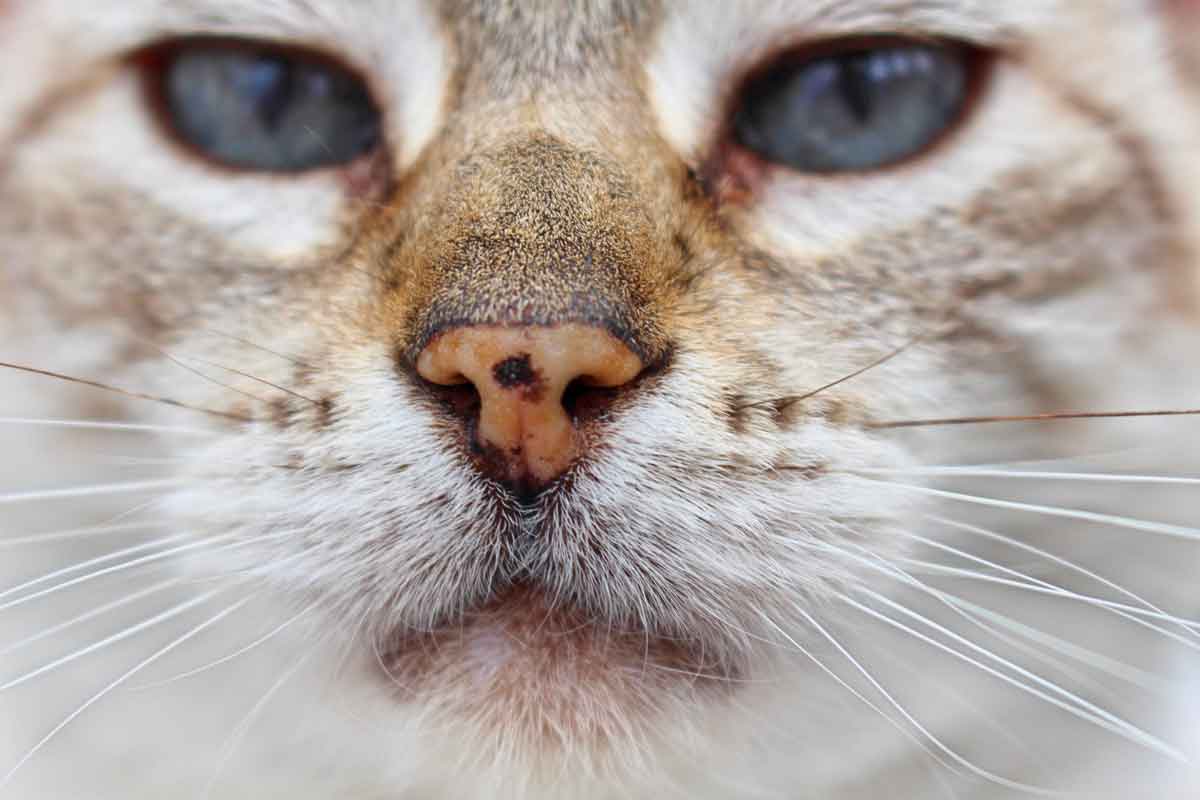Well, we know cats shed hair and even nails when they scratch, but what about cat whiskers falling out?
Is that something you should expect as a cat parent?
Or, is it something you should be worried about?
I am going to fill you in on what I learned about a cat losing whiskers so you can better understand the who, what and why this happens.
Oh, and for those that prefer more scholastic terms, whiskers are more often called “vibrissae“.
Now, if only I could say that!
Related: How often do you take a cat to the vet?
Why Do Cats Have Whiskers?

If you are not sure why cats have whiskers, we are going to start there.
First and foremost cats use their whiskers to help with balance.
They use those suckers to determine when a space might be too small for them and to help them navigate in smaller areas.
The ability to determine the space they are in is important to ensure they can move freely about and not get stuck in spaces that are too small.
Most cats have whiskers that are as wide as their bodies.
Whiskers also aid in movement in low light situations.
Whiskers are also very sensitive so if your cat is lounging about and a fly hits a whisker, they will know it and probably start swatting.
They act as little sensors so they can see what is right in front of them.
Why Do Cats Lose Whiskers?
I am going to break this down into natural reasons they may lose whiskers and not so common reasons.
Whisker Loss Is Natural
If you find an occasional loose whisker laying around, there is most likely nothing to worry about.
All cats will lose a few whiskers, just like people lose hair.
Cat’s whiskers naturally grow and shed and grow back.
Maybe a whisker was weak or damaged and just could not survive any more.
So, it will fall out to allow a newer stronger whisker to replace it. In most cases a cat will not lose more than 1 or 2 whiskers at a time.
Your cat may be losing them and you never see them either.
Remember, these guys get everywhere.
I most commonly find them under the bed in my daughters room since that is where she spends her days for reasons only she knows.
Good Luck?
According to some old wive’s tales, finding a cat whisker will bring you good luck!
When Whisker Loss Might Be A Concern
What if there is another reason your cat is losing whiskers?
These are less common reasons for cats to lose whiskers, but still worth noting.
If it is happening more than usual, it is definitely something you want to address.
Your Cat Has Allergies
If your cat has allergies, whether you know about them or not, it can result in them doing more scratching at their face to get relief.
They might also be rubbing more on walls or furniture which in turn may break whiskers.
If the allergies are really uncomfortable you may notice your cat not eating as much.
This would be an additional sign that they may need something to help them feel better.
Accident/Fighting
This is more common with outdoor cats, but an accident or some type of trauma can cause the whiskers to fall out.
Outdoor cats are more susceptible to getting into fights with out cats or be attacked by a wild animal which could cause harm to the whiskers.
In the home, there could be a fight between another a pet in the home which may cause whiskers to be pulled out.
Your Cat Has An Infection
A bacterial or fungal infection can cause those whiskers to fall out.
If your cat has an infection you may notice some changes to their skin and area around their whiskers.
If you notice a change then you should be sure to take your cat to the vet to get them help.
Your Cat Is Stressed
Yes, cats feel stress too.
If you have recently brought home a new pet or moved to a new home, these are big stressors for a cat.
When a cat is super stressed they can lose hair and/or whiskers too.
Cats need whiskers.
They serve a purpose and help your cat navigate their surroundings safely.
If you notice a few here and there, there is probably no cause for concern.
But, if you notice several in a short period then you definitely need to dig a bit and make sure your cat is healthy.

